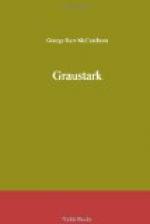“I’m delighted by his Highness’ condescension, which I perfectly understand,” observed Mr. Anguish. “Now, what have we to settle, gentlemen?”
“The detail of weapons.”
When Anguish announced that his principal chose pistols a strange gleam crept into the eyes of the Axphainians, and they seemed satisfied. Colonel Attobawn acted as interpreter during this short but very important interview which was carried on in the Axphain language. Lorry sat on the window-sill, steadfastly gazing into the night. The visitors departed soon, and it was understood that Prince Lorenz would condescend to meet Mr. Lorry at eight o’clock on the next morning in the valley beyond the castle, two miles from town. There was no law prohibiting duels in Graustark.
“Well, you’re in for it, old man,” said Anguish, gloomily, his chin in his hands as he fastened melancholy eyes upon his friend.
“Don’t worry about me, Harry. There’s only one way for this thing to end. His Royal Highness is doomed.” Lorry spoke with the earnestness and conviction of one who is permitted to see into the future.
Calmly he prepared to write some letters, not to say farewell, but to explain to certain persons the cause of the duel and to say that he gloried in the good fortune which had presented itself. One of these letters was addressed to his mother, another to the father of Prince Lorenz, and the last to the Princess of Graustark. To the latter he wrote much that did not appear in the epistles directed to the others. Anguish had been in his room more than an hour, and had frequently called to his friend and begged him to secure what rest he could in order that their nerves might be steady in the morning. But it was not until after midnight that the duellist sealed the envelopes, directed them and knocked at his second’s door to say:
“I shall entrust these letters to you, Harry. You must see that they start on their way tomorrow.”
Then he went to bed and to sleep.
At six his second, who had slept but little, called him. They dressed hurriedly and prepared for the ride to the valley. Their own new English bull-dog revolvers were to serve as weapons in the coming combat, and a carriage was to be in waiting for them in a side street at seven o’clock.
Before leaving their room they heard evidences of commotion in the hotel, and were apprehensive lest the inmates had learned of the duel and were making ready to follow the fighters to the appointed spot. There was a confusion of voices, the sound of rushing feet, the banging of doors, the noise increasing as the two men stepped into the open hall. They were amazed to see half-dressed men and women standing or running about the halls, intense excitement in their faces and in their actions. White uniformed policemen were flocking into the corridors; soldiers, coatless and hatless, fresh from their beds, came dashing upon the scene. There were excited cries, angry shouts and, snore mystifying than all, horrified looks and whispers.




